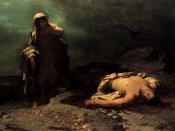The debate over who is the most tragic hero in Sophocles's Antigone continues on to this day. Many critics believe that Creon, the King of Thebes, is the most tragic one, but why is the play not entitled Creon? There is one question that needs to be answered before anything else: do the critics know the definition of a tragic hero? In a classic tragedy, a tragic hero is a noble person and heroic protagonist whose destruction is caused by a flaw in his or her character. Antigone's flaw, in the play, causes her to become involved in circumstances, which overpower and make her unable to deal with a destructive situation causes by the laws of Creon. Although the play ends with Antigone's death, she does experience an insight or awareness, which makes her and the audience more perceptive and aware. Antigone dies and Creon survives.
Therefore, Antigone deserves the title more than Creon does.
The fact that the play is entitled Antigone suggests the thought of her as the most tragic heroine of the play. She seems to fit the part in light of the fact that she dies in doing what is right. "We are only women," says Ismene, "we cannot fight with men, Antigone" (Sophocles Prologue.46). Ismene, her sister, refuses to help her in burying their brother, Polyneices. This is one indication that Antigone is alone but possesses bravery and courage in defying the laws of Creon.
Part of a tragic hero is doing something for the benefit of someone else, rather for than the greater glory of doing it. Antigone says of Ismene: "You may do as you like, since Balatbat 2 apparently the laws of the gods mean nothing to you" (Sophocles Prologue.60). This quote denotes that Antigone is giving a higher importance to the laws of the gods rather than those of Creon's. She, blinded by raw emotion and stubborn loyalty, intends to give her brother burial, knowing that the chastisement for her insubordination is death. Antigone's faith and obedience to the holy laws signify her worthiness of the title over Creon.
The readers and the audience might say Creon suffers greater hardships; on the contrary, many strongly believe that Antigone does. Creon is a selfish person, who only thinks about his success as a king. Even Teiresias, the blind prophet, cannot convince Creon with a prophecy. Antigone and Creon are similar in that they both endure great hardships. Creon experiences a longer suffering than Antigone does. She, however, experiences death, which is the worst of all the punishments that a person can endure in his or her life.
One more question to ask that may seem to bother the play's audience and readers' minds: what happens to Antigone after her death? Even though it is not mentioned in the play how Antigone lives after her punishment, many critics wonder if Antigone receives a proper burial. At the end of the play, Creon becomes very regretful and realizes the wrong decisions he makes. Antigone, however, may not receive a proper burial due to the previous laws of Creon. If so, then Antigone may still be suffering even more. Therefore, Antigone deserves the honor to be called the most tragic heroine in the play. No other person wants to suffer what Antigone encounters. Even Choragos believes, "Only a crazy man is in love with death" (Sophocles 1.76). So who has the heart to bury her? Nobody wishes for his or her own death, unless Ismene loses her mind and decides to bury Antigone.


